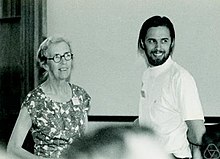Charles C. Pugh
Charles Chapman Pugh (* 1940 ) is an American mathematician who deals with dynamic systems.
Pugh received his doctorate in 1965 under Philip Hartman at Johns Hopkins University ( The closing lemma for dimensions two and three ). In 1967 he received a research grant ( Sloan Research Fellowship ) from the Alfred P. Sloan Foundation . He is now a professor emeritus at the University of California, Berkeley .
In 1967 he published a Closing Lemma named after him in the theory of dynamic systems. The lemma says: Let f be a diffeomorphism of a compact manifold with a non-moving point x. Then there is (in the space of the diffeomorphisms, equipped with the topology) in the vicinity of the diffeomorphism a diffeomorphism g, for which x is a periodic point. That is, with a small perturbation of the original dynamic system, a system with a periodic trajectory can be created.
In 1970 he was invited speaker at the International Congress of Mathematicians in Nice ( Invariant manifolds ).

Fonts
- Real mathematical analysis, Springer Verlag 2002
Web links
References and comments
- ^ Charles C. Pugh in the Mathematics Genealogy Project (English)
- ^ Pugh An Improved Closing Lemma and a General Density Theorem , American Journal of Mathematics, Volume 89, 1967, pp. 1010-1021, Christian Bonatti on Closing Lemma in Scholarpedia
- ↑ Wandering points were introduced by George Birkhoff and describe dissipative systems (with chaotic behavior). In the case of a dynamic system given by a mapping f, a point moves if it has a neighborhood U that is disjoint to all iterations of the point:
| personal data | |
|---|---|
| SURNAME | Pugh, Charles C. |
| ALTERNATIVE NAMES | Pugh, Charles Chapman (full name) |
| BRIEF DESCRIPTION | American mathematician |
| DATE OF BIRTH | 1940 |


